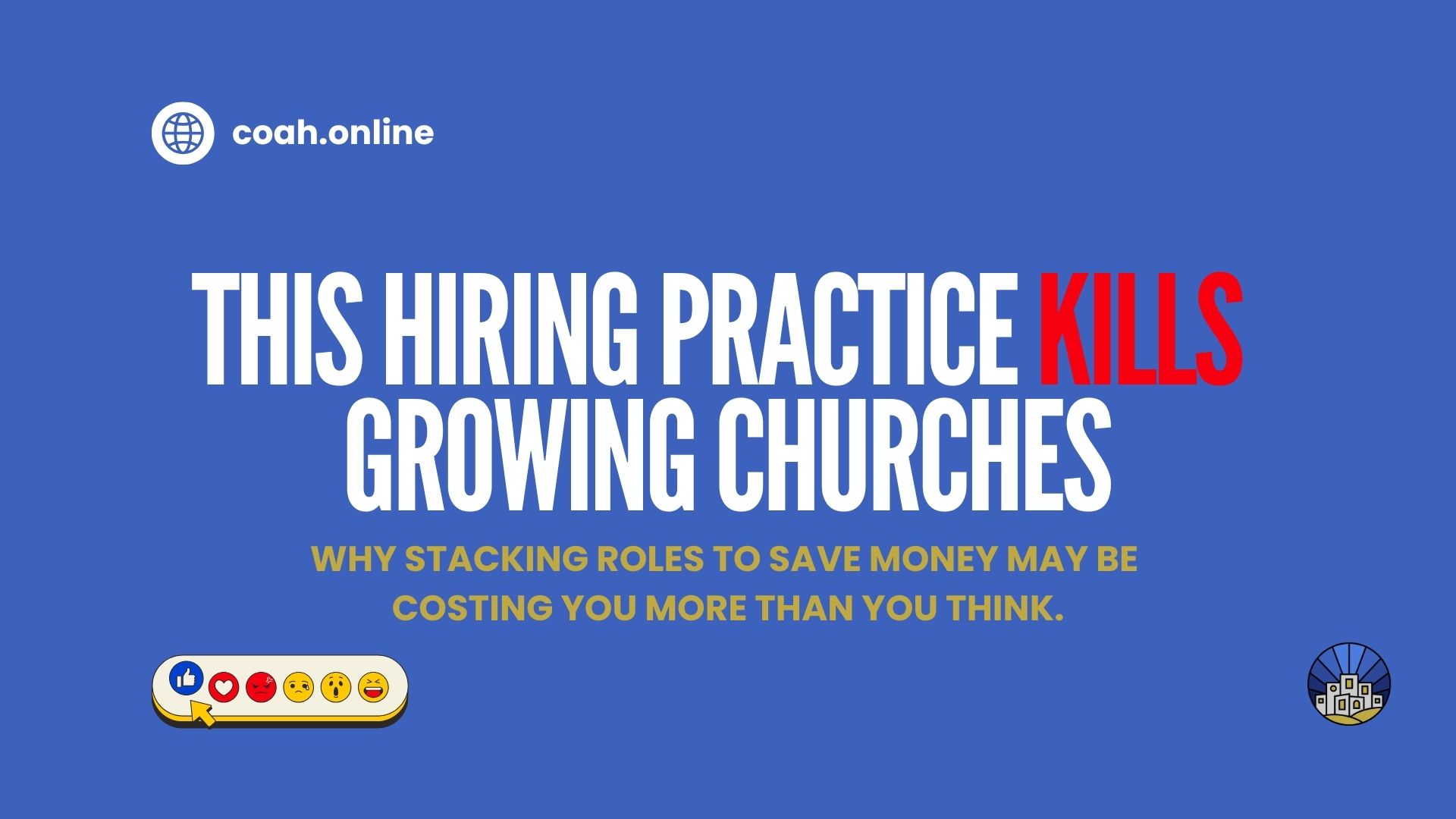As churches grow, so do their needs.
More people, more programs, more events—and naturally, more staff.
But here’s the trend I’ve seen time and time again:
Instead of hiring more, churches try to hire smarter—
by combining multiple roles into one person.
On paper, it makes sense.
Tight budget? Let’s merge roles.
“Maybe we can find a youth pastor who can also do social media!”
“Can our worship leader also run the website and write emails?”
“What if we had one person oversee kids, events, and the front office?”
Before you know it, you’ve created a job description that no actual human being can fill—without burning out or doing everything halfway.
The Shortcut That Costs You More
What starts as a cost-saving strategy ends up costing your staff their sanity…
and your church its quality.
You’ll notice the signs:
Events aren’t as sharp.
Communication feels reactive.
Volunteers feel confused or unsupported.
That new hire you were excited about? They look exhausted already.
And worse—the areas you were hoping would grow?
They stay stagnant.
Because instead of hiring for impact, you hired for efficiency.
Growth can’t be hacked.
You can build smart. You can build lean. But when you overload one person with multiple unrelated functions, you’re not building sustainably.
You’re just delaying the inevitable.
Your Hiring Strategy Builds a Reputation
Here’s something most pastors don’t think about—but they should:
The way you hire, staff, and structure your church builds a reputation—whether you like it or not.
Staff talk.
Leaders in your network talk.
And when people are considering applying to your church, they ask around.
I’ve been in rooms where staff quietly confide in friends and peers—not to gossip, but to process the real strain they feel in their roles. They still love Jesus, they love the church, but the experience of working for your church becomes something they quietly warn others about.
If your church gets a reputation for being:
Unclear
Underpaid
Overbearing
…you’re not just burning out your current team.
You’re burning bridges for the next one.
I’ve had churches offer me roles before—and I didn’t just read the job description. I asked the support staff what it’s really like. Not what’s on the wall or in the handbook—but what their Mondays through Fridays feel like.
So ask yourself:
What’s the reputation you’re building?
Not just in your city, but in the staff rooms behind closed doors?
✅ Here’s What To Do Instead:
1. Hire for clarity, not just competency.
Sure, they can wear multiple hats.
But should they?
Every added hat dilutes the focus and depth of the others.
If you’re combining roles, make sure they actually align.
(Ex: Worship + Production? Maybe. Worship + Admin + Communications? Not so much.)
2. Know the difference between a role and a person.
Just because you find someone who’s talented in multiple areas doesn’t mean it’s wise—or fair—to build a job description around all of them.
Focus your hires.
Support their lane.
And if they grow out of that lane—great. That’s a sign of health.
🚨 Bonus Thought:
Sometimes the best move isn’t to hire outside—
It’s to raise up someone inside.
But even then: clarity, support, and scope still matter.
Don’t give someone three departments just because they’re available.
💥 Double Bonus Thought (Tough Pill Edition):
Here’s a hard question I’ve had to ask a lot of leaders—and myself:
If your church doesn’t have the budget or people to run that ministry well… should you really be doing it at all?
Most of us know the verse from John 15:
“He cuts off every branch in me that bears no fruit, while every branch that does bear fruit He prunes so that it will be even more fruitful.” Join 15:2
But we rarely apply that verse to our calendars.
What Jesus is teaching isn’t just about getting rid of dead things — it’s about having the courage to cut back good things so that better fruit can grow.
That feels counterintuitive to pastors. Honestly, it almost sounds wrong to suggest cutting back ministries that are “working.”
But I’ve seen so many churches trying to run everything at once:
Youth night for every grade
Preschool
Knitting ministry
Surf ministry
Home fellowships
Songwriting collective
Prayer meetings
Seasonal outreach
And a dozen more sub-ministries that sounded like a good idea at the time
And guess what?
Very few of them are actually effective.
Most are one volunteer crisis or staff resignation away from collapsing — or at minimum, losing their excellence.
Not every opportunity is a calling.
Not every good idea needs to be executed in this season.
Especially if your staff capacity and budget don’t match your ambitions.
Sometimes pruning isn’t a step backwards — it’s an act of faith that makes room for something healthier to grow.
The truth is: trying to do everything at once can kill your effectiveness.
If you’re running 14 ministries, 9 groups, and 6 ongoing projects—
but can’t fund or staff them well—it might be time to prune something.
Not permanently.
Just for a season.
Because that margin you create?
It could give you the clarity, energy, and focus to build something better.
🎯 Final Thought:
Hiring isn’t just about filling a gap.
It’s about building a healthy team that can grow with you—
not get crushed under the weight of your calendar.
If you’ve felt this tension, you’re not alone.
We’ll be unpacking more hiring + team-building strategies in upcoming posts.
(And yeah, we’ll definitely talk about roles you should NEVER combine.)
Until then—
Prune with purpose.
Build with wisdom.
And don’t mistake survival for strategy.
—George

